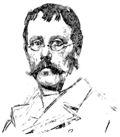Henrik Ibsen, Date of Birth, Place of Birth, Date of Death
TweetHenrik Ibsen
Norwegian playwright, theatre director, and poetAbout Henrik Ibsen
- Henrik Johan Ibsen (; Norwegian: ['h?nr?k '?psn?]; 20 March 1828 – 23 May 1906) was a Norwegian playwright and theatre director.
- As one of the founders of modernism in theatre, Ibsen is often referred to as "the father of realism" and one of the most influential playwrights of his time.
- His major works include Brand, Peer Gynt, An Enemy of the People, Emperor and Galilean, A Doll's House, Hedda Gabler, Ghosts, The Wild Duck, When We Dead Awaken, Rosmersholm, and The Master Builder.
- He is the most frequently performed dramatist in the world after Shakespeare, and by the early 20th century A Doll's House became the world's most performed play.Ibsen's early poetic and cinematic play Peer Gynt has strong surreal elements.
- After Peer Gynt Ibsen abandoned verse and wrote in realistic prose.
- Several of his later dramas were considered scandalous to many of his era, when European theatre was expected to model strict morals of family life and propriety.
- Ibsen's later work examined the realities that lay behind the facades, revealing much that was disquieting to a number of his contemporaries.
- He had a critical eye and conducted a free inquiry into the conditions of life and issues of morality.
- In many critics' estimates The Wild Duck and Rosmersholm are "vying with each other as rivals for the top place among Ibsen's works;" Ibsen himself regarded Emperor and Galilean as his masterpiece.Ibsen is often ranked as one of the most distinguished playwrights in the European tradition.
- Richard Hornby describes him as "a profound poetic dramatist—the best since Shakespeare".
- He is widely regarded as the foremost playwright of the nineteenth century.
- He influenced other playwrights and novelists such as George Bernard Shaw, Oscar Wilde, Arthur Miller, James Joyce, Eugene O'Neill, and Miroslav Krleža.
- Ibsen was nominated for the Nobel Prize in Literature in 1902, 1903, and 1904.Ibsen wrote his plays in Danish (the common written language of Denmark and Norway during his lifetime) and they were published by the Danish publisher Gyldendal.
- Although most of his plays are set in Norway—often in places reminiscent of Skien, the port town where he grew up—Ibsen lived for 27 years in Italy and Germany, and rarely visited Norway during his most productive years.
- Born into a patrician merchant family, the intertwined Ibsen and Paus family, Ibsen shaped his dramas according to his family background and often modelled characters after family members.
- He was the father of Prime Minister Sigurd Ibsen.
- Ibsen's dramas have a strong influence upon contemporary culture.
Read more at Wikipedia
See Also
- Famous People's Birthdays on 20 March, Norway
- Famous People's Birthdays in March, Norway
- Famous poet's Birthdays on 20 March, Norway
- Famous poet's Birthdays in March, Norway
- Famous playwright's Birthdays on 20 March, Norway
- Famous playwright's Birthdays in March, Norway
- Famous author's Birthdays on 20 March, Norway
- Famous author's Birthdays in March, Norway
- Famous librettist's Birthdays on 20 March, Norway
- Famous librettist's Birthdays in March, Norway


 Date of Birth:
Date of Birth:  Place of Birth: Skien, Eastern Norway, Norway
Place of Birth: Skien, Eastern Norway, Norway
